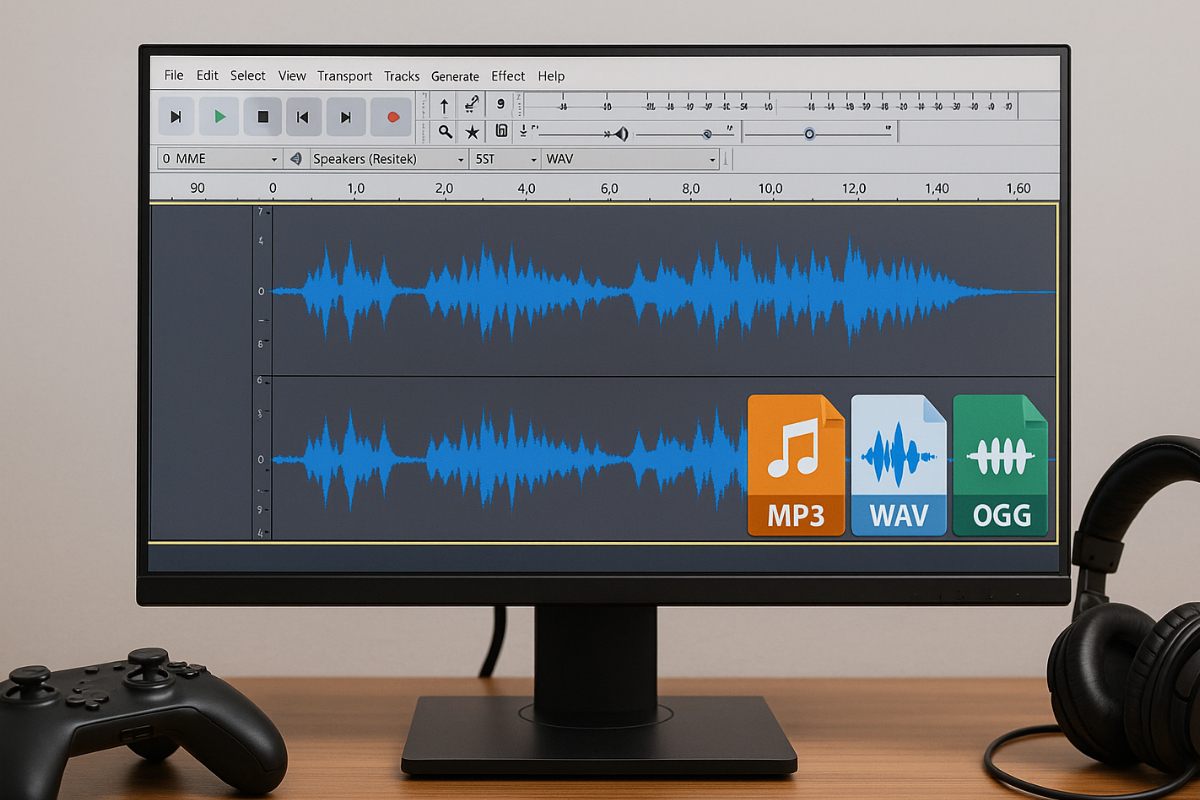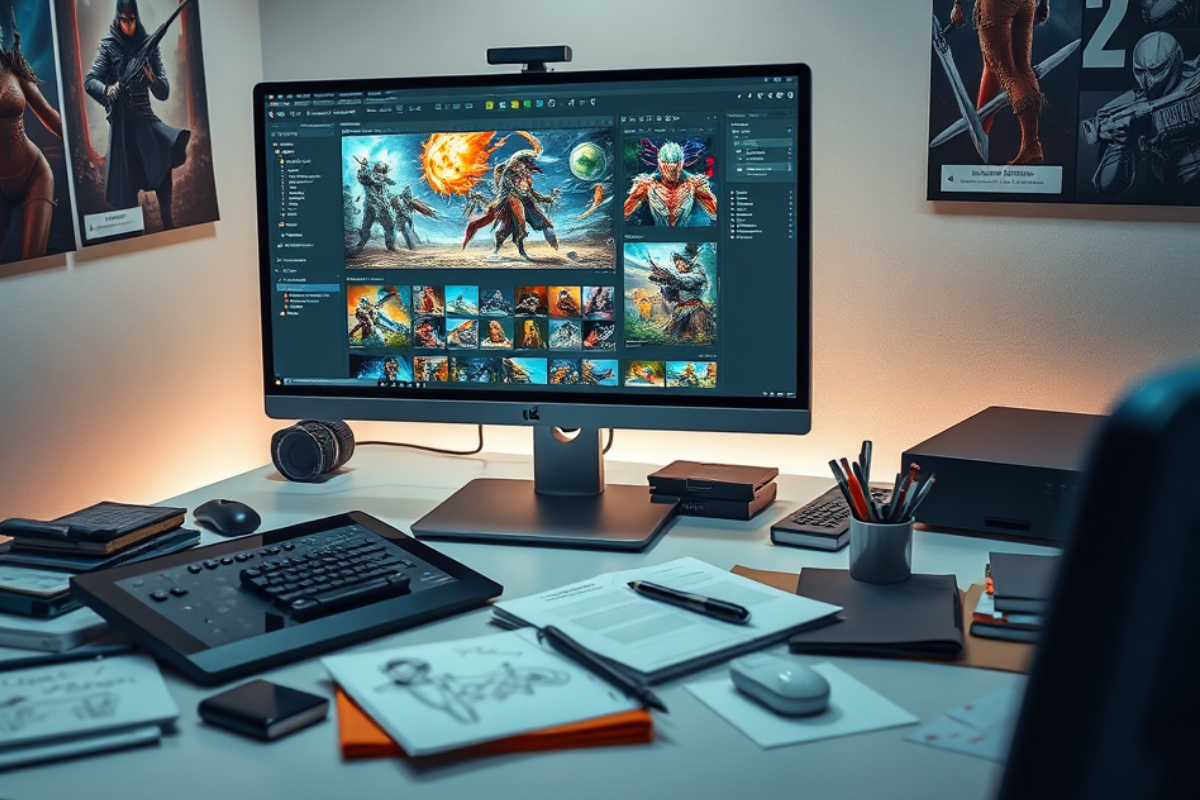Many gamers, content creators, and modders look for ways to convert game audio files to make it easier to use and edit their favorite sounds from games. The ability to convert these audio files allows them to be used across different platforms and projects, ranging from personal listening to creating videos or custom mods.
To do this properly, having the right audio converter that supports various formats and qualities of game audio files is important. With the appropriate tool, the conversion process becomes easier while preserving the sound quality you want to use.
What to Expect in This Article
- Understanding game audio files: Learn about the different types of audio files used in games and why they need to be converted.
- Choosing the right audio converter: Discover tools you can use to convert game audio files into your desired format.
- Step-by-step guide: Follow a detailed process on how to convert audio files using selected tools.
- Editing and using converted audio: Learn how to edit and utilize the converted audio files for various purposes.
- Avoiding common errors: Identify possible issues and how to prevent or solve them.
What Is a Game Audio File?
A game audio file is a type of file used by video games to play sounds during gameplay. These can include music, sound effects, or character dialogues. Usually, these files are encoded in proprietary or unusual formats such as:
- .brstm – used in Nintendo games
- .fsb – commonly used in Unity-based games
- .xwb – used in Xbox games
- .wem – used in games that utilize the Wwise audio engine
- .bnk – binary sound bank files used in various AAA titles
These formats cannot be opened easily with regular music players like VLC, Windows Media Player, or iTunes. Therefore, they need to be converted into more familiar and easier-to-use formats such as .mp3, .wav, or .ogg.
Why Convert Game Audio?
Original game audio files are not always accessible or editable because they are often encoded in unusual formats. Converting them into more familiar and compatible audio formats is necessary for various purposes. Here are some main reasons gamers, content creators, and modders convert game audio files:
For Playback
Many gamers want to replay their favorite soundtracks or ambient sounds from a game. Conversion lets them play these sounds anywhere—on phones, laptops, or speaker systems.
For Content Creation
YouTubers, streamers, or podcasters often need game audio for their projects. Converted files are necessary to edit and integrate into their content.
For Modding
Many modders use converted audio to replace sounds in a game, such as sound packs or custom voice lines.
For Archiving
Some players and game historians archive audio files as part of video game preservation.
Types of Game Audio Files
Behind every successful video game is carefully crafted sound, from music to the tiniest rustle, that brings the whole player experience to life. These aren’t just sounds; each audio file plays a role in shaping emotions, tension, and immersion in the game. To use or convert them properly, understanding the different types of game audio files is essential.
Background music
Music that plays during gameplay, setting the mood for a scene or entire level. For example, a sad piano for a dramatic cutscene or a fast techno beat for intense combat. These are often looped to avoid interruption during play.
Sound effects
Short sounds that emphasize actions or interactions, such as explosions, gun reloads, or footsteps. Though brief, they greatly enhance the realism and feedback of the game.
Voice acting
Dialogue lines, narration, or announcer voices that help convey the story and personality of characters. This is especially important in RPGs and story-driven games to feel emotions and recognize characters.
Ambient sounds
Environmental sounds like wind blowing, ocean waves, or rustling leaves that provide a natural and realistic atmosphere. Although often unnoticed, these are vital for immersion; without them, the game world feels artificial.
Each type of game audio is saved in various formats such as .ogg, .wav, .mp3, or proprietary formats from game engines like Unity or Unreal. Because of this, files often need conversion for editing, archiving, or playback on different devices.
How to Choose the Right Audio Converter
It’s important to choose an audio converter that suits the format of your game audio files and your conversion goals, whether you are a gamer, content creator, or modder.
Compatibility
Make sure the converter supports the input and output formats you need, especially proprietary formats.
Ease of use
Choose a tool with a user-friendly interface to avoid difficulty in conversion, especially if you lack a technical background.
Quality
Ensure the converter can preserve audio quality, especially if you want to maintain sound fidelity.
Batch conversion
If you need to convert many files, a tool with batch conversion saves time.
Popular and reliable tools include Audacity, VLC Media Player, and online converters like Convertio and CloudConvert, known for their functionality and ease of use.
Step-by-Step Guide to Converting Game Audio Files
For gamers and content creators, the right process to convert game audio files is crucial to maintain audio quality and usability. You don’t need to be a tech expert—just the right tool and a few simple steps:
Download and install the chosen audio converter
For example, if you choose Audacity, visit their official website and follow the installation instructions. Ensure you obtain the installer from official or trusted sources to prevent malware.
Import the game audio file
Open the converter and load the audio file you want to convert. Most programs have a “File > Open” option or a drag-and-drop feature for easy import.
Choose the desired output format
Pick an output format compatible with the device or application where you’ll use the audio. For instance, MP3 for universal playback or WAV for higher quality.
Set conversion settings
You may adjust bitrate, sample rate, and other settings as needed. If unsure, use default settings or select a “high quality” preset.
Convert and save the file
Start the conversion process by clicking the convert button. When finished, save the converted file in a folder that’s easy to find or use it immediately for your project.
Editing Game Audio After Conversion
After converting the audio file, you can edit it using audio editing tools like Audacity. Here, you can trim, loop, or adjust the volume of the audio as you like. Edited audio files can be used for mods or content creation on social media and other platforms.
Common Errors and How to Fix Them
The process of converting game audio files is not always perfect, and sometimes results can be problematic. Recognizing common errors helps you address them quickly and avoid project delays.
- Unsupported file format: Make sure the file extension is correct and supported by your converter.
- Audio sync issues: This can happen if there’s a sample rate mismatch; check and adjust the settings.
- Loss of quality: Choose lossless formats like WAV or FLAC if you want to maintain high quality.
- File corruption: Always back up original files before starting conversion.
Legal and Ethical Considerations
When converting game audio files, it’s important to consider legal aspects. Some game audio may be protected by copyright, so ensure you use it only for personal purposes or with permission from the owner. Avoid uploading copyrighted audio on public platforms without proper authorization.
Recommended Audio Converters for Gamers
For gamers and content creators, choosing the right audio converter makes converting game audio files easier. Here are some recommended tools that are user-friendly and effective for different needs:
- Audacity: Free and open-source audio editor with conversion capabilities.
- VLC Media Player: Besides playing media, it can also convert audio files.
- Convertio: An online tool supporting many audio formats.
- CloudConvert: An online converter with advanced settings for audio conversion.
Tips for a Better Game Audio Experience
If you want to make the most of every sound from your favorite game, here are some simple ways to improve your overall audio experience. Conversion alone is not enough—it’s also important to use the right settings and formats.
- Use lossless formats: For higher audio quality, choose formats like WAV or FLAC.
- Adjust audio settings: Modify bitrate and sample rate according to your needs.
- Experiment with different formats: Try various audio formats to see which works best for your project.
- Always back up: Before converting or editing, ensure you have backups of the original files.
Convert Game Audio Files for Wider Use
Converting game audio files with an audio converter gives you the freedom to use them in many ways—from personal listening to content creation. With the right tools and knowledge, you can maximize the potential of game audio files and use them in ways that suit your needs. Don’t be afraid to try different formats and settings to get the best results for your project.



